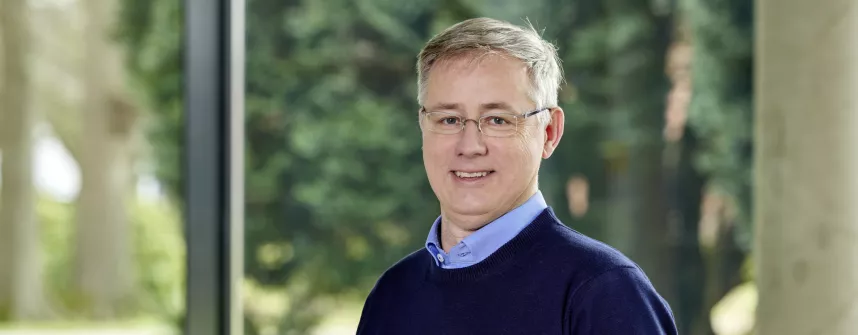Team led by Professor Kleinekathöfer achieves breakthrough in research on vitamin B12 uptake
A team of scientists led by Dr. Ulrich Kleinekathöfer, professor of Theoretical Physics at Constructor University in Bremen, has now discovered how B12 is absorbed by certain intestinal bacteria. Published in the journal "Nature Communications" at the beginning of August, the findings will serve as a basis for research on how to better fight diseases and develop better antibiotics.
Kleinekathöfer and his team’s breakthrough finding, what they call “pedal-bin mechanisms”, offers critical understanding for how bacteria in the intestine known as bacteroides can absorb vitamin B12. This is important for human health since B12 cannot be produced or absorbed by humans themselves. The scientists’ name for the finding derives from its similarity to the pedal mechanism of a bucket; the proteins have a lid that opens when vitamin B12 is nearby, takes it in and closes again. Other bacteria do not have this mechanism.
“In this project we aimed at understanding the mode of action of the vitamin B12 uptake system,” Kleinekathöfer said. “Although the human gut microbiome has been implicated in many aspects of human health, the uptake of small molecules by gut bacteria is poorly characterized.”
Kleinekathöfer and his team believe the results can help to design antibiotics which are not being taken up by gut bacteria. Since intestinal bacteria are "good" bacteria, research is interested in ensuring that they are not killed by absorbing antibiotics. However, further research will need to first explain through which proteins the gut bacteria do actually take up antibiotics. In the future, this finding could be the basis for placing specific substances in the bacteria in order to fight diseases.
"Our simulations at the molecular level helped interpreting the results obtained by our experimental colleagues,” Kleinekathöfer said. “A detailed understanding of these processes is potentially a first step in curing problems in the gut microbiome.”
The research team focused on specific proteins of the bacterium, of which three variants exist. The starting point was static crystal structures of the proteins provided by scientists from Newcastle University, a cooperation partner in this project. The Constructor University team then used simulation to determine the capture process of B12 by the proteins. The simulations allowed the researchers to simulate several hundred thousand atoms simultaneously.
Publication:
Abellon-Ruiz, et al., Nat. Commun. 14, 4714 (2023)
https://doi.org/10.1038/s41467-023-40427-2
Scientific contact:
Dr. Ulrich Kleinekathöfer| Professor of Theoretical Physics
ukleinekathoefer@constructor.university | Tel.: +49 421 200-3523
About Constructor University:
Founded in 2001, Constructor University is a top-ranked, English-language, private university, with a campus in Bremen, Germany. With its interdisciplinary approach, advanced digital learning tools and accredited programs, it equips students with fundamental knowledge, critical thinking and practical skills to build their professional career and address the world’s most pressing challenges.
The University emphasizes a synergetic and entrepreneurial spirit, offering program mentoring from top-tier professors and industry experts. Partner collaborations include the Constructor Institute in Schaffhausen, Switzerland, Carnegie Mellon, the National University of Singapore, the University of Geneva, and industry references such as Anisoprint, JetBrains and ChemDiv.
Internationality and diversity lie at the heart of Constructor University, with more than 110 nations at its vibrant and close-knit campus community in Bremen. There, students enjoy active campus life, with access to clubs, professional networks and academic counselling, essential to their personal and academic growth.
Research-centric faculty projects at the University are funded by the German Research Foundation, the European Union's Framework Program for Research and Innovation, and globally leading companies.
The greater Constructor Knowledge ecosystem includes Constructor University in Bremen, Germany, and Constructor Institute in Schaffhausen, Switzerland. It is a provider of education services with education tools, worldwide traditional and online educational services, as well as advisory and strategic services to education customers in the fields of student recruitment, communications, and marketing support.
